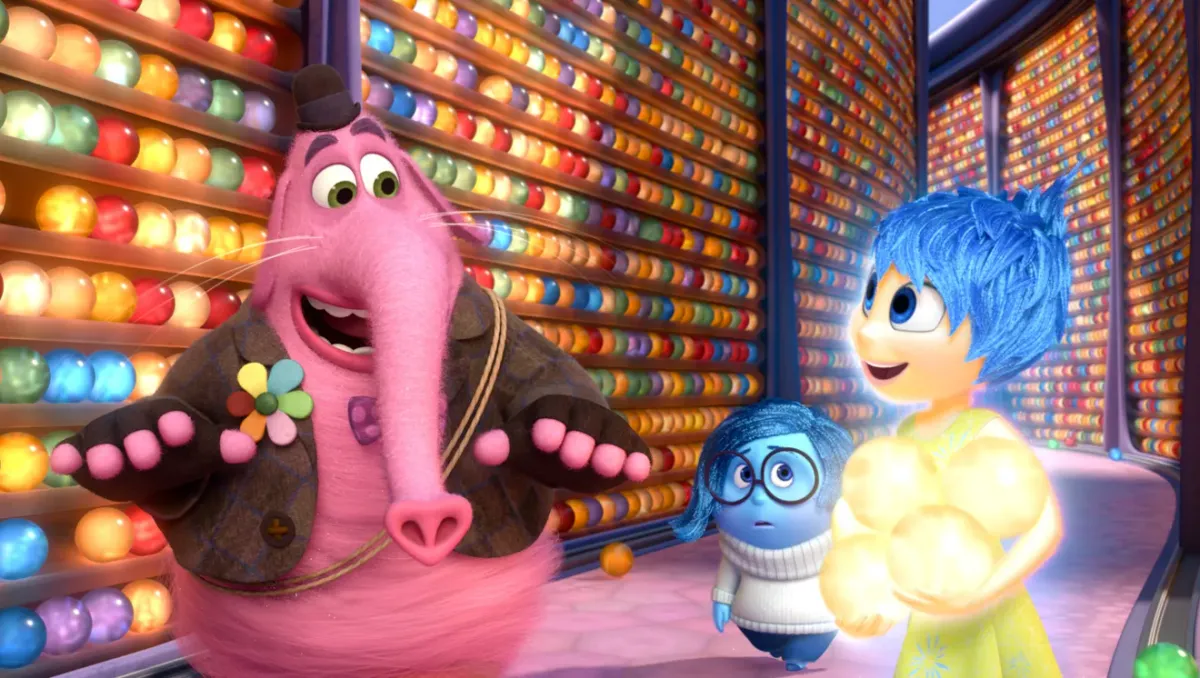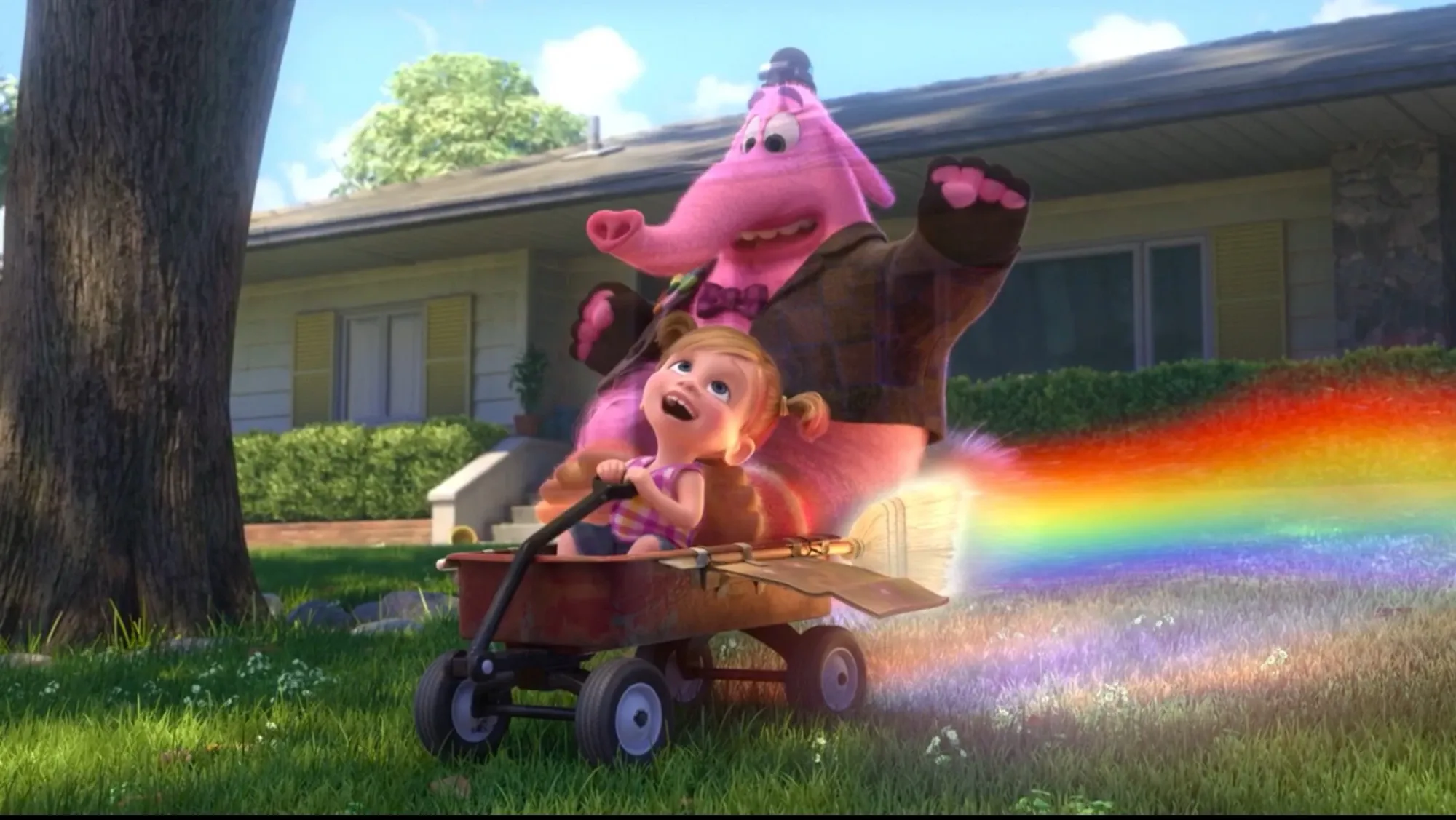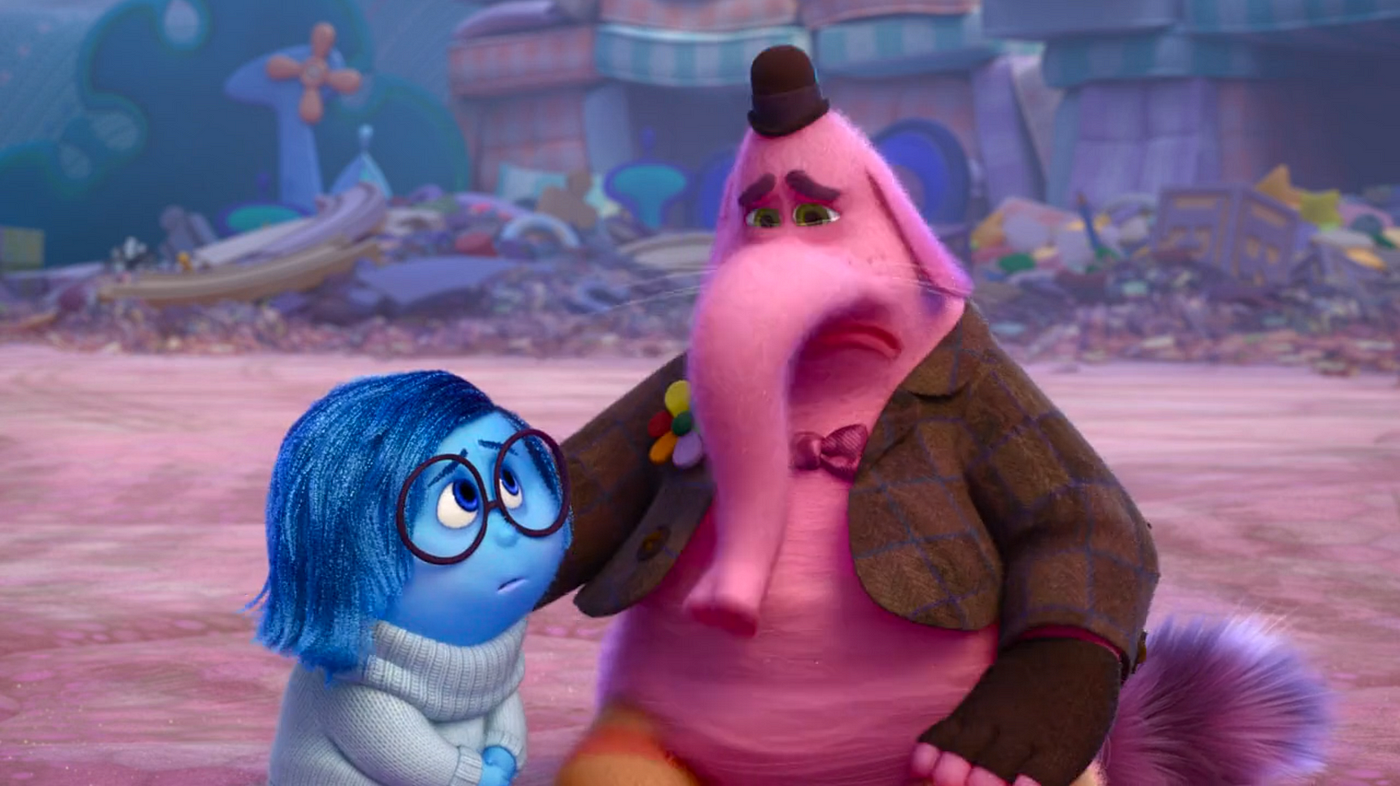It is good that Bing Bong is dead
Or: Who do you think Pixar's Inside Out is about anyway?

Pete Docter's 2015 film Inside Out is, for many people, the highlight of Pixar's last decade. Its vision of how emotions influence our thoughts and decision-making has proved surprisingly enduring as a metaphor, leaving a larger cultural footprint than any Pixar film since Toy Story 3 in 2010.
It is also a deceptively complicated story. The film boasts two protagonists – Joy and Riley – but one of those protagonists is nested within the other, meaning that their journeys are simultaneously separate but twinned. In theory, Riley is Joy's boss, but much of the movie seems to suggest that Riley does what Joy says she should. The metaphor works pretty well – after all, as we mature, we gain better control over our emotions (in theory) – but when you start to press on it too hard, you can see its flaws in a way you don't with, say, the toys' relationship with their children in Toy Story. (Those films routinely say, "Please don't forget the toys are functionally immortal, and isn't that kinda fucked up?" and I say, "Please tell me more" every time.)
Beyond metaphorical implications, the obvious reason for why Inside Out is a film about Joy learning to let go just a little bit is because, like many of Pixar's best films, it is a story about parenting. In both Inside Out and its sequel, Joy is effectively Riley's mom, and the journey of both films is about her learning to let go of her little girl.
In Inside Out, this idea runs as a line through every layer of the film's metaphysics. Riley's parents praise her for how happy she is, so she overvalues that ability within herself (her "Joy," so to speak), and, thus, doesn't really allow her other emotions to take hold in the same way. The metaphor does sort of turn the inside of your brain into an Apple store. But so many child therapists have used this movie to talk to their young patients about the swirling emotions in their heads that I feel churlish complaining too much about how clean the personification of the inside of your brain is.
Except, perhaps, for when it comes to Bing Bong.

Spoilers for Bing Bong??
Of all the canonical "oh my God, you will cry so hard" Pixar things – the opening montage in Up, the third act of Toy Story 3, "Remember Me" in Coco, etc., etc., etc. – Bing Bong is the one I find the least moving.
Bing Bong, voiced by Richard Kind, is Riley's imaginary friend from when she was a kid. When Joy finds herself far away from headquarters, Bing Bong helps her find her way around Riley's brain, and when Joy finds herself in a place where she will eventually fade from Riley's memory entirely, Bing Bong sacrifices himself to help her escape. This happens almost exactly at the end of the film's second act, and the second Bing Bong dies, this movie starts cooking.
(Sidebar: Okay, so Bing Bong's sacrifice means Riley forgets about him, but does Joy still remember him? If we accept that Joy is Riley's mother, more or less, then I guess this makes sense, but it still twists my brain in knots.)
Anyway, when I saw Inside Out for the first time, roughly a week after its initial release. I had been told by multiple friends that there was a part that was so sad, maybe the most sad, and I had to be prepared, and when the moment arrived and passed me by, I turned to my wife and said, "That was it?" She shrugged. "That was it!" she said. I found myself much more moved by the film's third act, in which Riley finds the words to tell her parents how much she misses Minnesota – and her parents tell her how much they miss it too.
Every time I rewatch Inside Out, I expect the Bing Bong moment to hit me harder than it has before – especially now that I'm a parent – and every time, I still find myself thinking, "That was it?" Some of that is the almost programmatic nature of Bing Bong's sacrifice. The second Joy says she'll make sure Riley remembers Bing Bong, you know that fucking elephant-cat-dolphin is doomed. Yet the Up montage is similarly obvious in how it's going to jerk every one of your tears, and I don't bristle at that. It's necessary for that movie to work in a way Bing Bong just isn't. You could make a version of Inside Out that is roughly the same as the one we have without Bing Bong, and it would be just as good. It might even be better! Up without the opening montage is unquestionably a weaker film.
And yet I can hear the many fans of Bing Bong readying their salvos! Inside Out without Bing Bong? How would that even work? He's a necessary part of Joy realizing that Riley needs Sadness, too. His sacrifice shows how Joy is learning to let go of the parts of Riley that will change as she grows older. And metaphorically speaking, he helps the audience understand the film's larger depiction of maturation, a process that carries with it a certain wistful sadness.
So Bing Bong is necessary, right? I was wrong all along? Well... remember how I said this movie had two protagonists?
Do you think this movie is about Joy, or do you think it's about Riley?

If you predominantly read Inside Out as a story about parents learning to let go of their kids, then, yes, Bing Bong is a necessary part of that story. He represents the little things you will always remember about your kids that they will naturally forget because they are becoming their own people. My kid is all of 20 months old, and I'm already finding myself cherishing memories of a person they will never be again. We can argue about if Bing Bong is the best way to depict that reality, but within the "this movie is about a mom letting go of her daughter" reading, you need something like Bing Bong for the story to work.
Yet in contemplating this question, I realized that I've never really watched Inside Out as Joy's story. Yes, she's the character we're following on her wild voyage, and she's the character with the most fully realized arc in the film. But everything she does services Riley's arc. Her realization is pretty much just "Riley needs to feel all of her emotions," but that's something only Riley can do. Every time I've watched this movie, the character whose arc resonates most powerfully for me has been Riley, which might be why I'm slightly more disquieted by some of the metaphorical implications of the film's Big Idea. Joy! Let this girl have her free will! (MOM, GET OUT OF MY BRAIN, GEEZ.)
If you watch the film as one about Riley, then the Bing Bong stuff is largely an occasionally enjoyable tangent. It's fun to have a character who's gotten so used to the back corridors of Riley's brain that he can serve as a tour guide for some of them, and he allows for some tender exploration of who Riley was as a little kid. Yet when it comes to "Should Bing Bong sacrifice himself to make sure this girl can experience joy?" the question isn't even a question. Of course he should! Why would he not? Riley is rapidly approaching adulthood. She needs to be able to go into the world and have her own experiences and live her own life. She needs to literally let go of childish things, like her imaginary friend.
Again, the "this movie is about letting go of a child approaching adolescence" reading of the film places a lot more of the weight in my question on "Should Bing Bong sacrifice himself" because being a parent is being constantly aware of the things you sacrifice to make sure your kid is okay. But I think centering that perspective within a movie that is literally about that girl is ultimately the wrong choice to make, especially when the presence of her actual parents complicates that metaphor in interesting ways.
It may also explain why so many of the people I know who are most destroyed by Bing Bong are dads. (NOTE: GENDER ESSENTIALISM IS A TRAP; MANY PEOPLE WHO ARE SAD ABOUT BING BONG ARE NOT DADS. GLAD WE COULD CLEAR THIS UP!) Within the world of Riley's brain, Bing Bong is the most dad-like figure we find, the fun-loving masculine id to Joy's overprotective feminine superego. The games Riley plays with Bing Bong aren't so hard to imagine her playing with her dad, and the ways in which he sees her as just the best kid and his little pal are... well, I mean, they're dad-like. Bing Bong bing bonged so Bandit Heeler could soar.
Not to gender this even further, but Inside Out arrived in the midst of a period when everyone was asking, "When will Pixar make a good movie about girls?" It took a stab at this with 2012's Brave, a film I like a lot but also an extremely messy film where the woman who was directing it was fired midway through production. And while Inside Out was directed by a man and co-written by men, it is unquestionably a film about a girl – and also the weird mom who lives in her head. Its concluding passages, in which that girl gets through a horrible time in her life and learns to accept the growing complexities of her emotions, are the scenes that most often make me cry, and I find it very strange to then have someone say, "Yes, but did you remember that girl had an elephant dad? Whom she forgot??"
Look: If you love Bing Bong, if you mourn him, if you wish for his strange resurrection in Inside Out 3 as the imaginary friend of Riley's child, via some weird genetic memory mechanism, go nuts. I certainly don't hate the character, and I love Kind's warm performance of him. I do, however, think that we need to stop thinking about Bing Bong's sacrifice and start thinking about what was gained. In that view, Bing Bong's death isn't particularly sad. Indeed, it's almost joyful. We pay for who we become with who we were, after all, and Riley seems like she's becoming a pretty great person.
Therefore, there can be only one conclusion: Like Christ, E.T., and WALL-E before him, it is good that Bing Bong died. And even better that he stayed dead.
The free edition of Episodes, which (usually) covers classic TV and film, is published most Wednesdays, and the subscriber-supported edition of Episodes, which covers more recent stuff, is published every Friday. It's written by Emily St. James. If you have suggested topics, please comment (if you are a paid subscriber) or post in the paid-subscribers-only Discord.




